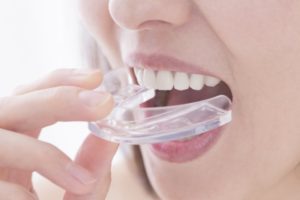
Bruxism (unconscious teeth grinding and clenching) is a fairly common problem. According to some estimates, it afflicts up to 8% of middle-aged adults. If you belong to that group and you have missing teeth that you would like to replace, you may wonder how your condition will affect your treatment options for rebuilding your smile. There is good news — although bruxism poses some risks to dental implants, it does not automatically disqualify you from getting them. This blog post further explores the relationship between bruxism and dental implants.
How Bruxism May Affect Dental Implants
Dental implants are incredibly tough. However, just like natural teeth, they are not immune to the consequences of bruxism. If you grind your teeth while you sleep, you may have no control over how much force your upper and lower teeth exert on each other. Some people exert up to 250 pounds of force on their teeth while they are asleep! In contrast, chewing usually exerts only 70 pounds of force.
That degree of pressure created by bruxism has the potential to damage the restorations on top of dental implants. This could lead to the need to replace the restorations sooner than originally planned. Even worse, bruxism could exert so much force on the bone around the implants that the bone suffers damage, causing an implant to become loose and be at a heightened risk of failure.
Preventing Bruxism from Damaging Dental Implants
During your dental implant consultation, your dentist will look for signs of bruxism. If they determine that bruxism is a problem, they will create a plan to help you manage it. In many cases, a custom nightguard is an effective solution. Although the nightguard will not stop the bruxism itself, it will prevent damage that could occur as a result of the teeth grinding. It does so by placing a barrier between the upper and lower teeth.
In addition to using a nightguard, you can try other ways to reduce bruxism. For example, many patients find that reducing stress can lower instances of teeth grinding. Treatment for TMJ disorder (TMD), a condition that afflicts the jaw joint, may also be helpful.
After your dental implants are in place and it is time to place restorations on them, your dentist will carefully design your new teeth so you enjoy harmonious occlusion (a proper bite). This will minimize any damage your teeth might suffer damage when they contact one another.
Bruxism is a serious oral health problem — but it does not have to ruin your teeth or your dental implants in Lebanon. Your dentist is ready to help you explore your treatment options and get you on the road to a healthy, complete smile.
Meet the Practice
Santavicca Dental Professionals features an expansive team of dentists and specialists. Together, they are able to offer comprehensive dental implant treatment as well as solutions for bruxism, including custom nightguards. To learn more about your tooth replacement options and how to care for your teeth, contact our office at 603-600-6398.
